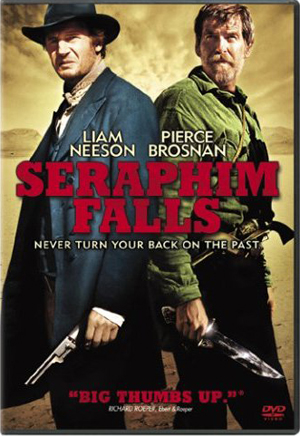
SERAPHIM FALLS
US, 2006, 115 minutes, Colour.
Liam Neeson, Pierce Brosnan, Michael Wincott, Ed Lauter, John Robinson, Anjelica Huston, Kevin J. O’ Connor, Tom Noonan, Angie Harmon, Xander Berkeley.
Directed by David Von Ancken.
Seraphim Falls is a visually beautiful but thematically grim western. Its plot is very similar to the classic Clint Eastwood film of 1976, The Outlaw Josey Wales. While that film began with the post Civil War raiders burning the farmer’s home and killing his wife and child and Josey Wales then going on a revenge pursuit, Seraphim Falls opens in mid-pursuit, the farmer chasing the Union commander who ordered the burning of his property which led to the deaths.
Pierce Brosnan is Gideon, the Union officer. Liam Neeson is the former Confederate officer who is bent on revenge.
The pursuit takes them through the snow and ice of the mountain forests of Nevada (with New Mexico standing in for these locations, the waterfall actually in Oregon), down river and the waterfall, to the isolated lowlands to a town, to the site of work on railroad tracks, past a group of religious settlers and into the desert for the showdown. One saying goes, ‘Revenge is sweet’. That is definitely not the message of this film.
Apart from the two men, there is a posse, frightened children in a cabin, the railroad builders, a lying reverend, a mysterious Indian in a top hat whose name is Charon and a well-dressed travelling saleswoman, played by Anjelica Huston. By the time we meet Charon, we are wondering if the two men are, perhaps, already dead, playing out the final stages in a purgatorial confrontation. Certainly, Madame Louise appears in dry desert and seems to disappear, as do the images of the two men at the end.
The director has spoken of mythic westerns and that is the thought that occurs a number of times while watching the film. So, how much is real and how much is surreal and symbolic? During the final confrontation there is a vivid flashback to show the horror of what happened at the fateful burning of the house.
The physical endurance of Gideon, especially in the frozen mountains as well as his skills in survival make this a very tough film. The long pursuit, the deaths and the revenge motivation mean that is also harsh and relentless.
1.The impact of the film? As a western? Drama? Psychological drama? Revenge drama?
2.The location photography, its beauty? Starkness? The mountain scenery, the lowlands, the railroad tracks, the desert? The musical score?
3.The basic revenge plot? The mythic overtones of the western? The west as a place for revenge? Pursuit?
4.The Civil War background? The suggestions of flashbacks throughout the film? Leaving the flashback till the end? Carver and his farm, his wife child? Working? The Union soldiers coming? Gideon and his orders, the confrontation between the two, the war over? The men searching the house, ignoring the baby? The orders to set the barn alight, the burning of the house, the wife and son going in to rescue the baby, looking from the window? Carver’s grief? Gideon and his thinking the house was empty, his walking away?
5.The film opening in mid-pursuit? Gideon and his being alone in the mountains? Shot? The physical presentation of his survival, falling down the mountain? The fires, eating the rabbit? Into the river? Trying to cross the bridge? The waterfall? His survival? Underwater, taking off his coat? His continuing through the forest?
6.Carver, his posse? Shooting Gideon? The continued pursuit? Relentless? Their tracking down Gideon after finding the fire? Pope and his being under the tree, the dropping blood? The knife and his death? The continued pursuit? Gideon and his getting into the lowlands? Seeing the hut? The frightened children? The father, the gun? His getting out? The pursuers?
7.Gideon’s encounter with the religious settlers, their religious comments, his moving through?
8.The railroad tracks, the Chinese working, the bosses? Apprehending Gideon? Tying him up, the guard, Gideon attacking him, getting the knife, free? The Chinese, getting the horse? His escape? Carver and his arrival with the posse, the suspicions of the railroad boss? Getting the horses and leaving? The grim picture of the railroad depot?
9.Gideon, his skills, the trap, the death of the young man in the posse? Gideon and his going out into the desert area? His encounter with Chron? The Indian, the exchange, the money, the water? Carver and his arrival with Chron? The same process?
10.The final part of the film? Were the men already dead? Parsons and his decision to pull out of the posse – and Carver killing his horse? Hayes and his standing in front of Carver, Gideon shooting him?
11.The trek out into the desert? The mythic landscape? The purgatorial experience? The two men gaining and losing their horses? The encounter with Madame Louise? Her offering the remedy? Her deals with them?
12.The final chase, the two men in the desert, the confrontation? The flashback inserted at this moment? The effect on each of them? The nature of revenge? Their dropping their weapons? Walking separately into the desert? Disappearing?
13.How well did the film incorporate both the realism of the west as well as its mythic qualities? The religious dimensions and values in terms of violence and revenge?